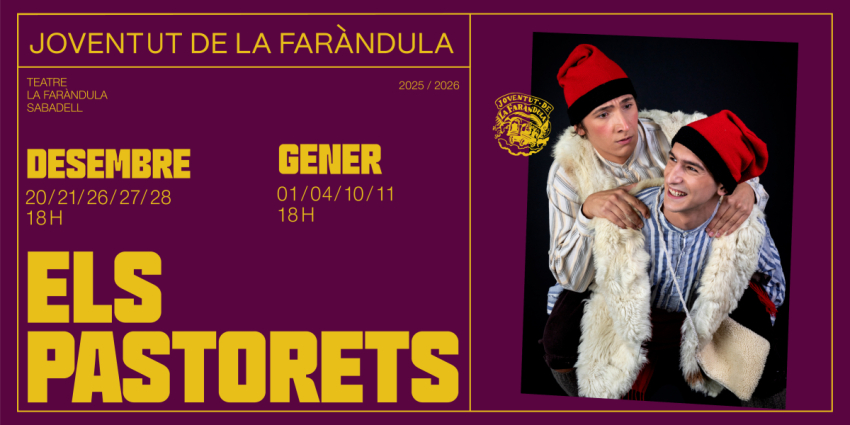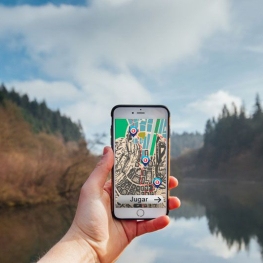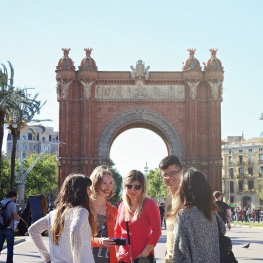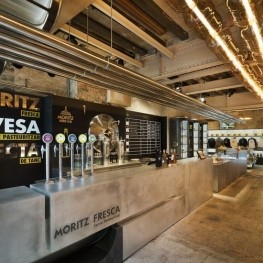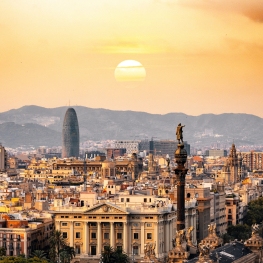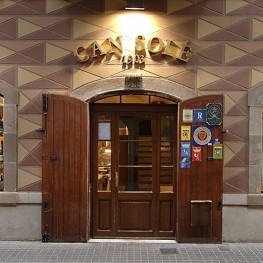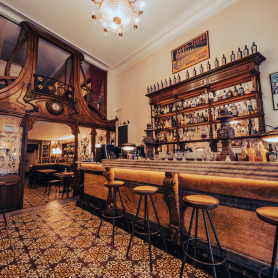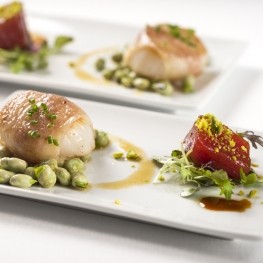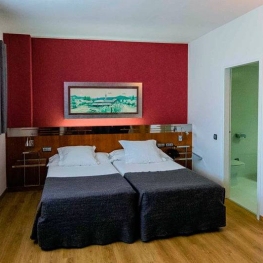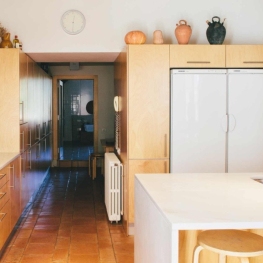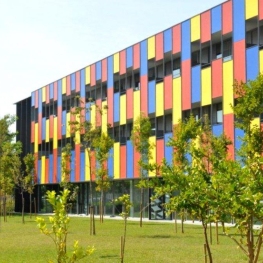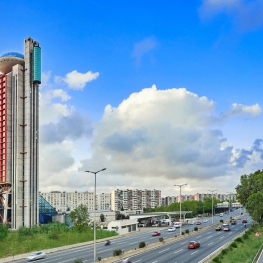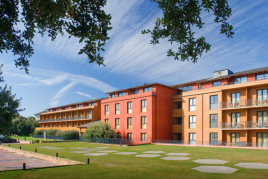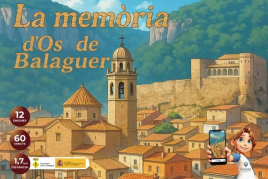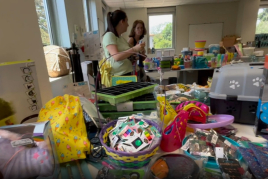Barcelona defenders Guilds in 1714 (Part II)
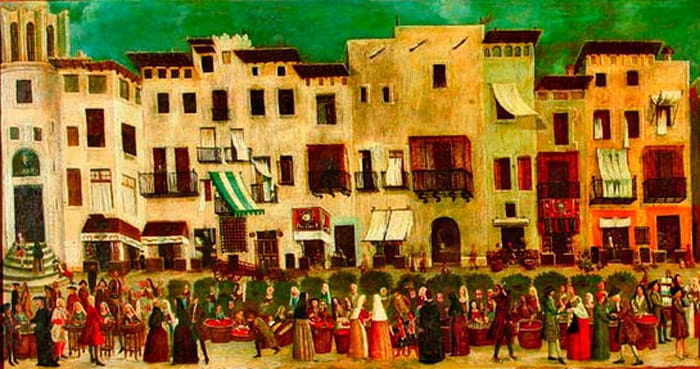
femTurisme.cat already has a dedicated path to the guilds who defended the city of Barcelona during the siege of September 11, 1714: Supporters guilds Barcelona (Part I) .
This is the second part of the route and is dedicated to those guilds working different types of non-food materials, since the other route and groups these associations.
So, apart from knowing the different unions that were in the city, also know what were the areas of defense and we will walk through the wall and bulwarks that made ??it up to recognize the perimeter of the old city.
Walking around the city of Barcelona is different when you have this view and one can imagine what it was like at that time: the buildings, the streets, everything he had and that is gone and what had not, and now I it is.
Guild wax candlesticks
 The wax candlesticks worked the wax imported from North Africa or the Baltic. The wax that came from the bees was yellow and was used for religious ceremonies and for wealthy families.
The wax candlesticks worked the wax imported from North Africa or the Baltic. The wax that came from the bees was yellow and was used for religious ceremonies and for wealthy families.
To work it was bleached, fire and melt it down in a stream of cold water until lumps are formed. Once cooked, spread on the roofs and sun dried and whitened.
Wax street in the Raval district, has this name because of the large number of roofs were dedicated to this function.
During the siege of Barcelona , the guild of wax candlesticks defended the stronghold of Lift and had headquarters in the church of Santa Ana, as part of the battalion of Santa Madrona Coronela.
Guild carpenters
 The guild was a guild of carpenters who left several branches as they were specialized according to the task carried out.
The guild was a guild of carpenters who left several branches as they were specialized according to the task carried out.
In Barcelona , the Carpenter Court, which is responsible for advising the government on issues of public works and infrastructure, and even the decoration of the church of Santa Maria del Mar. periodically chose
The battalion was the carpenters' guild of Our Lady of Mercy of the Colonel, so we had like quarter the Convent of Santa Monica and also defended the stronghold of Lift.
Guild of shoemakers
 The shoemaker was one of the most essential within a city. That is why, already is aware of their presence in the form of guild in Barcelona since 1203, under the name of San Marcos Guild Guild Master Shoemakers Barcelona.
The shoemaker was one of the most essential within a city. That is why, already is aware of their presence in the form of guild in Barcelona since 1203, under the name of San Marcos Guild Guild Master Shoemakers Barcelona.
It was so important that even financed altarpieces and other decorations for religious buildings, such as the chapel of St. Mark's Cathedral.
They were part of the battalion of Santa Eulalia in Barcelona and the Colonel were devoted to guarding the gates of the city. Its headquarters was installed at the Monastery of San Pedro de Puelas.
Guild sailors
 Seafaring main task was to port traffic, fishing and boating. This made ??it a very poor guild in general. For this reason, many sailors, once lost city, they had to devote to the construction of the Citadel.
Seafaring main task was to port traffic, fishing and boating. This made ??it a very poor guild in general. For this reason, many sailors, once lost city, they had to devote to the construction of the Citadel.
Still, solidarity prevailed over the collective and co took care of the funeral of fellow and widows.
Your task during the siege of the city was defending positions crossing the defenses. The guild of sailors was part of the battalion and the Immaculate Conception of Mary Immaculate of the Colonel and had headquarters in the Convent of Santa Clara.
Silk Guild sailboats
 The Guild of Silk sailing was one of the most important associations of Barcelona , as it was one of the pioneers of trade routes on the peninsula.
The Guild of Silk sailing was one of the most important associations of Barcelona , as it was one of the pioneers of trade routes on the peninsula.
The office of sailing was different, as were engaged in weaving different types of material, although they were specialized and, in this case, worked smoothly.
Unlike the guild of sailors, sailing the guild did not care for the widows and many had ended in abject misery until three widows in 1663 launched the "Lawsuit women" who four years later allowed to continue with the business and sell candles that were made.
 The Guild of Silk sailboats built a building near Via Laietana which now houses the College of Mayor Art Silk and when we contemplate the registration of the guild membership.
The Guild of Silk sailboats built a building near Via Laietana which now houses the College of Mayor Art Silk and when we contemplate the registration of the guild membership.
His battalion was the Santa Madrona of the Colonel, his headquarters, the church of Santa Ana, and their backcourt, the gap Portillo of Windmills near the bastion of Santa Clara.
 Sculptors Guild Barcelona
Sculptors Guild Barcelona
The Sculptors Guild was, in a sense, faced with the guild of carpenters, as they often did similar tasks and could involve competition. In the late seventeenth century it was decided that the guild of sculptors be responsible for contracting and making retablos.
The Sculptors Guild Barcelona battalion was part of the Santa Eulalia de Barcelona of the Colonel, defended the Portal Nou and the convent of San Agustin and had the barracks to the monastery of San Pedro de Puelas.
Guild colchoneros
 The Guild mattress was one of the strongest in the city of Barcelona , as they were quite active. Their task was based on make and unmake mattresses At that time there were many types.'s Wool - for who could afford them - the cork shavings and a mixture of straw and dry leaves.
The Guild mattress was one of the strongest in the city of Barcelona , as they were quite active. Their task was based on make and unmake mattresses At that time there were many types.'s Wool - for who could afford them - the cork shavings and a mixture of straw and dry leaves.
Apart from making them, the mattress also rented mattresses, beds, sheets, cushions and pillows for those who were in the city of passage.
Its headquarters were located in the convent of San Francisco de Asis, his defense was the gap left bastion of Santa Clara and were in the company of San Severo Coronela.
Guild of Blacksmiths
 The Blacksmiths Guild is one of several guilds of trades related to the art of fire, such as boilermakers, the swordsmen, the claveteros, locksmiths or knife. Still, there were towns where all grouped under the same guild of blacksmiths.
The Blacksmiths Guild is one of several guilds of trades related to the art of fire, such as boilermakers, the swordsmen, the claveteros, locksmiths or knife. Still, there were towns where all grouped under the same guild of blacksmiths.
The defensive task Guild blacksmiths during the siege of Barcelona in 1714 focused on the Portal Nou, its headquarters was located in the Convento de San Francisco de Asis and were part of the battalion of San Severo Coronela.
The bastions
 The city of Barcelona was defended by a wall and eleven bastions that protected it from attack. There were few bastions that protected the city from attacks that could be made ??from the sea, but the vast majority of defenses were oriented inward, to provide for the defense that could make attacks from the mainland.
The city of Barcelona was defended by a wall and eleven bastions that protected it from attack. There were few bastions that protected the city from attacks that could be made ??from the sea, but the vast majority of defenses were oriented inward, to provide for the defense that could make attacks from the mainland.
Highlights include the stronghold of Lift that was located approximately in the center of the current zoo enclosure Barcelona , Parc de la Ciutadella and was located between Migdia stronghold located near the Pla de Palau - whose remains are buried in the parking of a new building-and the bastion of Santa Clara - that would be located in a fairly central part of the park Ciutadella-.
 Towards the innermost area of the city was the stronghold of the Portal Nou currently stand at the highest point of the ride Lluís Companys, with the Arc de Triomf. Starting from here, as it was linked to the Ronda de San Pedro where he had installed the bastion of San Pedro, near the Monastery of San Pedro de Puelas. Jonqueres Bulwark of that fit current and ground Urquinaona Portal Angel, as the name says, would be in the area Portal del Angel next to Plaza Catalunya.
Towards the innermost area of the city was the stronghold of the Portal Nou currently stand at the highest point of the ride Lluís Companys, with the Arc de Triomf. Starting from here, as it was linked to the Ronda de San Pedro where he had installed the bastion of San Pedro, near the Monastery of San Pedro de Puelas. Jonqueres Bulwark of that fit current and ground Urquinaona Portal Angel, as the name says, would be in the area Portal del Angel next to Plaza Catalunya.
At this point, the wall went up to the current Gran Via de les Corts Catalanes and a large imposing fortress today houses the University Square. Then descended the wall Round San Antonio to find Ronda de Sant Pau, which converge the bastion of San Antonio.
Finally, the wall would follow the current until you reach Avenida Parallel Drassanes where the bastion of Santa Madrona was.'s Wall be closed to return to the Paseo Colon to the stronghold of the South.

What to do
Gymkana Digital Turística
BarcelonaTourist and cultural routes in a gymkhana format. Completely free and without…
Gimcanes GeoCats
BarcelonaDiscover Barcelona with GeoCats in the most convenient and fun way possible!…
Fàbrica Moritz Barcelona
Barcelona (a 1.3 Km)The Moritz Factory Barcelona is a unique space, divided into three floors,…
Itinera Plus Visites escolars educatives BCN
BarcelonaItinera Plus is committed to a new way of highlighting heritage and…
Where to eat
Fàbrica Moritz Barcelona
Barcelona (a 1.3 Km)The Moritz Factory Barcelona is a unique space, divided into three floors,…
Bar Muy Buenas
BarcelonaFew words better define Muy Buenas than "coherence." Purely modernist decor, restored…
Restaurant Windsor
Barcelona (a 2.2 Km)The Windsor restaurant, located in Barcelona, is a benchmark of contemporary Catalan…
Where to sleep
Aparhotel Atenea Barcelona
Barcelona (a 4.1 Km)The Aparhotel Atenea Barcelona, located in the heart of the Les Corts…
Ca l'Andreu Ecoturisme
Tiana (a 14.3 Km)Spending a few days in an authentic 15th-century farmhouse is priceless. Renovated…
Alberg Centre Esplai, Fundesplai
El Prat de Llobregat (a 11 Km)Discover the Centro Esplai hostel, in the municipality of El Prat de…
Hotel Hyatt Regency Barcelona Tower
Barcelona (a 7.1 Km)The Hyatt Regency Barcelona Tower hotel will offer you an unforgettable experience…

